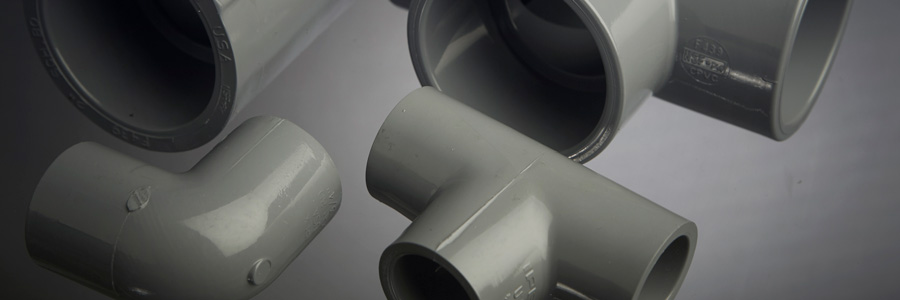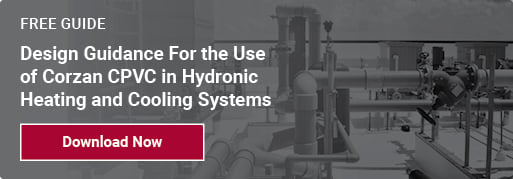Introduction to CPVC
How often do you consider what’s behind the walls? When it comes to piping systems, out of sight doesn’t mean out of mind. Choosing the right plumbing material for your commercial project can influence installation times, water quality, and long-term performance.
In most cases, CPVC is an ideal option, offering the right combination of reliability and efficiency. Here’s what you need to know about CPVC.
What Is CPVC?
Commercialized in 1958, chlorinated polyvinyl chloride (CPVC) is a thermoplastic produced by chlorination of polyvinyl chloride (PVC) resin. Two-thirds of CPVC resin’s weight is salt; only one-third is from petroleum resources.
Pipe manufacturers use Lubrizol’s CPVC powder as the raw material to manufacture CPVC piping under brand names such as FlowGuard Gold, Blazemaster, and Corzan.
Corzan is ideally suited for commercial applications as well as a wide variety of process industries requiring corrosion resistance at high temperatures. Corzan pipe is available up to 24" in diameter. Corzan pipe from select manufacturers meets the 24448 cell class up to 8" diameter, as defined by ASTM D1784.
CPVC is self-extinguishing and has relatively low smoke generation. It has a much higher limiting oxygen index (LOI) value than many other common materials of construction, and thus will not support combustion under normal atmospheric conditions.
What Are the Benefits of CPVC Piping Systems?
With 50 years of proven performance, Corzan CPVC is the ideal choice for high-capacity, high-pressure commercial potable water systems. Corzan has proven to be:
- Durable: Corzan CPVC plumbing systems will not pit, scale, or corrode like metallic systems—regardless of water quality.
- Cost efficient: A Corzan CPVC system costs less and is faster and easier to install than traditional metal systems. No torches required. Pipe and fitting are solvent-welded quickly and firmly. Also, over the long term, the Corzan system offers additional savings because it is highly energy efficient.
- Selection: Pipes and fittings up to 24" meet the needs of nearly any commercial project.
- Quiet: This CPVC product line has been proven by NSF International to be four times quieter than a copper plumbing system. This is key for hotels, dorms, hospitals, and multifamily dwellings where sound transmission and acoustic control are a concern.
- Plenum approval: Water-filled ½" and 6" SCH 80 Corzan pipe have a flame and smoke rating less than 25/50 in accordance with UL 723/ASTM E84.
In What Types of Projects Can CPVC Be Used?
Corzan CPVC piping systems are ideal for nearly all commercial applications, including schools, office buildings, retail, and hospitals. It also is suitable for industrial applications including chemical processing, manufacturing, mineral processing, wastewater treatment, power generation, and marine.
How Are CPVC Piping Systems Installed?
Installation of CPVC piping systems is straightforward and efficient. Installation often costs less, thanks to superior methods, lightweight construction, and stable raw material costs.
Corzan piping systems can be installed using one of two methods: chemical joining or mechanical joining.
The chemical joining process is called solvent welding. Installers cut the pipe, clean the pipe and fittings, apply a primer and solvent cement outside of the pipe and the inside the fitting socket, assemble the joint, and verify proper installation. The science of solvent-welding, which forms a chemical bond, ensures that a properly installed Corzan fitting is the strongest part of the system.
Mechanical joining options consist of cutting and grooving the pipe, then connecting pipe sections with specialty fittings. Mechanical joining options are especially ideal for alterations or repairs, as they eliminate drying time and shorten system downtime.
How Does CPVC Compare to Other Piping Materials?
For both new systems and retrofit applications, Corzan piping systems offer a tremendous value versus metallic and non-metallic options even at elevated temperatures at pressure up to 200° F (93° C). Additionally, over the long-term, Corzan CPVC technologies can result in a significantly lower total installed cost than most other piping alternatives due to stable material costs, a longer service life resulting from the product's natural chemical resistance, lower maintenance costs, reduced downtime, and a fast and easy installation process requiring no electricity.
Vs. Copper
Modern testing procedures tell us copper isn’t the long-term solution we thought it was decades ago. While copper is highly durable and affordable compared to other metal piping, it breaks down with extended use. In addition, copper pipe scales over time. Such scale buildup drastically reduces water flow and eventually creates the need to fully replace the copper system. Corzan pipe and fittings are immune to corrosion and will never scale.
Copper prices have skyrocketed over the past decade and are prone to fluctuations, whereas CPVC material costs are lower and more stable. Plus, fast and easy installation can reduce installation costs by as much as 50% over copper, depending on the size and scope of the project.
Copper’s surface roughness—it starts smooth but becomes rougher as it ages—increases its potential for growth of biofilm, which can harbor legionella and other bacteria.
Vs. PEX
PEX is popular among installers because of its easy installation and perceived low cost. But its long-term performance can’t match that of CPVC. A new industry standard, ASHRAE 188-2015, recommends treating pipe systems with super-heated (170 degrees) and super-chlorinated water. CPVC is naturally chlorine-, chloramine-, and chlorine dioxide-resistant because it is made with chlorine, which is a large atom that will protect the carbon chain it is bonded to. However, PEX is not rated for service with chlorinated water above 140 degrees F.
Even in buildings that do not follow CDC guidelines, other factors, such as a boiler malfunction, could kick water temperatures to above levels deemed safe for PEX.
The antioxidants in PEX piping can also be consumed by UV light, whether from the sun or a fluorescent bulb.
PEX requires expensive expansion and crimping tools. PEX fittings, including the body and crimp rings, typically cost several times more than comparable CPVC fittings. The PEX fittings also result in a joint that is the weakest point of the system and the most vulnerable to failure. Large-diameter PEX has limited flexibility and requires the same number of joints as Corzan, with two to three times more hangers.
Vs. PPR
Polypropylene has a limited history in American plumbing systems. Its installation requires a lengthy welding process, and it requires the use of auxiliary reinforcement materials for hot water distribution. Both of these factors can significantly increase the overall install cost. It also is susceptible to chlorine degradation.
Vs. Stainless Steel
Stainless steel offers a more stable price versus copper, but requires welders for installation.
Vs. Other CVPC
Corzan is designed to meet the highest ASTM D2837 standard, a long-term stress test that forces water through the pipe at varying temperatures to ensure quality. Corzan is the only complete CPVC pipe and fitting materials pressure rated by the Plastic Pipe Institute® (note, not all Corzan fittings are made from pressure-rated materials). Corzan is tested to the highest performance standards and consistently outperforms other CPVC materials by a significant margin.
Are CPVC Systems Compatible With Other Materials?
Corzan is the only plumbing system supported by the FBC System Compatible program to help eliminate guesswork associated with identifying chemical compatibility of ancillary construction products. Other CPVC products may vary in molecular weight, chlorine content, and compound additive, which means users of non-Corzan plumbing systems have no other option other than to consult directly with the manufacturers of the pipe, fittings, and ancillary products.
From straightforward installation to reliable performance to water quality, Corzan CPVC piping systems provide the ideal combination of attributes to meet the needs of nearly every commercial and industrial project. To learn more, schedule an appointment with a Lubrizol expert.


